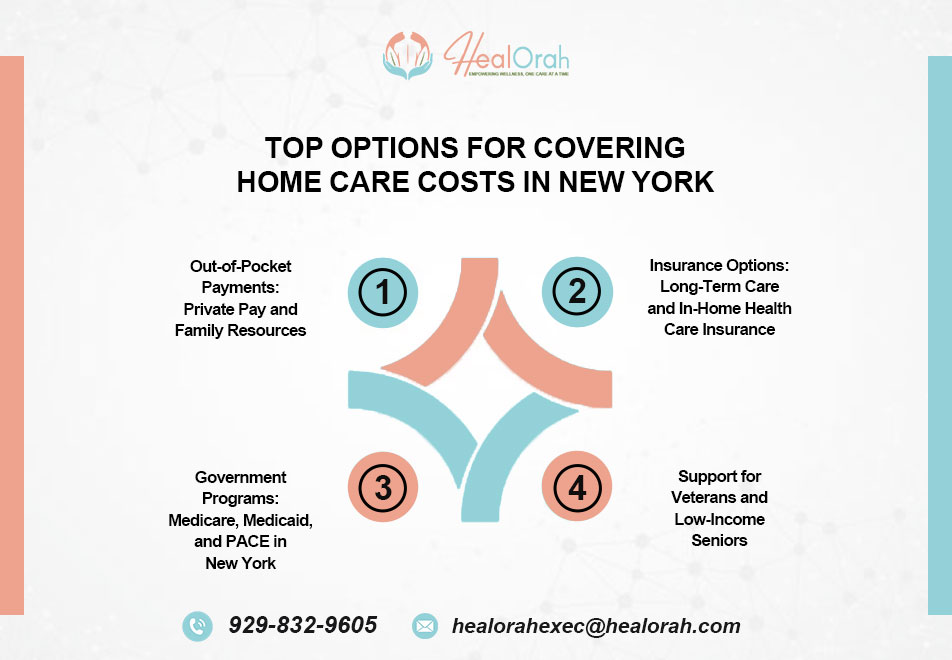Many seniors need help at home as they grow older. Paying for home care can be hard. The best ways to pay for home care depend on the person’s needs. In New York, care costs are often very high. Families feel pressure because of these rising home care costs for the elderly.
Table of Contents
ToggleSome use private money while others need insurance. Moreover, many ask if Medicare home helper options are enough. In truth, support comes from different sources. That is why it is important to know all the choices. This guide will explain smart and trusted payment options. We aim to help families plan with care and ease.
Out-of-Pocket Payments: Private Pay and Family Resources
Many families use their own money to pay for home care services. This is called private pay. They may use savings, monthly income, and retirement money. Some people also use home equity and reverse mortgages. Moreover, this helps when fast care is needed.
In New York, home care costs for the elderly can be $25 to $40 per hour. Families choose this when they want full control over the care. This option suits those who do not qualify for Medicaid and Medicare. It offers flexibility and quick access to trusted care.
Long-Term Care and In-Home Health Care Insurance
Long-term care insurance helps pay for care when a person gets old and sick. It supports help at home, like bathing, dressing, and nurse visits.
Home health care insurance also covers home services. Moreover, hybrid plans give both life and care benefits for more coverage and peace of mind.
- Long-term care insurance covers daily care at home.
- In-home health care insurance helps pay for nurses and helpers.
- Hybrid plans mix life and care coverage.
- Choose a plan based on health needs and family budget.
Govt Programs: Medicare, Medicaid, and PACE in New York
There are many ways to pay for in-home care. Medicare helps only with short-term care. It does not cover daily home needs. Medicaid helps more by offering MLTC, CDPAP, and CFCO services.
These give free and low-cost home care. Moreover, the PACE program supports full care for elderly people at home and helps reduce the overall cost of in-home care.
- Medicare covers limited short-term skilled care.
- Medicaid supports long-term home care options
- PACE offers full care for the elderly at home
Support for Veterans and Low-Income Seniors
Many veterans and low-income seniors in New York can get help paying for care. They may qualify for VA Aid and Attendance and Housebound benefits, which give extra monthly money for in-home help. Moreover, some nonprofits and grants support seniors who cannot pay the full costs.
These programs often work with home care agencies that New York families trust. To apply, seniors must meet income, health, and age rules. Because the process includes forms and proof, it may take time. Still, this support can ease the cost and give better care at home.
Comparing Home Care Payment Methods: What Works Best for You?
Choosing the best way to pay for home care can be confusing. You must know what each method offers. Compare all options before making a final choice for your loved one.
Monthly Cost Comparison Chart
Each option has a different cost. Medicare covers less. Medicaid helps more. Insurance offers long-term care. Private pay needs your savings.
- Medicare covers short-term skilled care, not long-term services
- Medicaid supports low-income seniors with full coverage
- Private pay often costs $25–$40 per hour in New York
Eligibility and Flexibility Checklist
Some programs have strict rules. Others are more flexible. Pick the one that fits your family’s needs best.
- Medicaid needs income and asset checks before approval
- Insurance may require buying plans before old age
- Private pay gives full choice in care services

Pros and Cons of Each Payment Option
Every method has good and bad sides. Compare cost, control, and coverage. Choose what brings comfort and value.
- Medicare has limited benefits and strict time limits
- Medicaid offers full help but has less freedom
- Private pay gives freedom, but is often expensive
Why Choose HealOrah for Your Home Care Planning in New York
HealOrah is a trusted name for home care in New York. They understand every family is different, so they offer simple help that fits your needs. Moreover, they guide families to find the best ways to pay for home care. This includes options like Medicaid, insurance, and private payment.
In addition, they help you with forms and answer your questions in easy words. Because the process can feel hard, their team makes it clear and stress-free. Speak with HealOrah to plan your home care costs wisely and make smart choices with confidence.
Conclusion
Planning is the smartest way to save time, money, and stress. It helps families avoid last-minute pressure when choosing care. There are many ways to pay for home care, like insurance, savings, and Medicaid. Some people also use in-home health care insurance and VA benefits.
Because every option is different, early research helps you pick the best one. Moreover, planning gives peace of mind and better control over care choices. It is wise to speak with trusted home care agencies in New York for clear support. In short, taking early steps today means comfort, care, and fewer worries tomorrow.
FAQS
Does Medicare cover the cost of in-home care in New York?
Medicare covers limited in-home services like skilled nursing or therapy, not full-time personal care. It is best for short-term recovery.
How much does in-home care cost in New York?
In-home care in New York costs between $25 $40 per hour. Rates vary by care type and service provider location.
Can Medicaid help pay for elderly home care services?
Yes, Medicaid offers MLTC and CFCO programs that support elderly home care. Eligibility depends on income and medical need requirements.
Are there insurance plans that cover in-home care services?
Long-term care insurance helps cover in-home health costs not paid by Medicare. Hybrid life policies may also include care benefits.
What support is available for veterans needing home care?
Veterans may qualify for Aid and Attendance benefits to fund in-home care. These benefits help cover caregivers and daily assistance needs.





